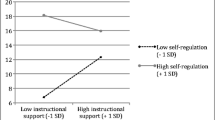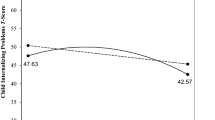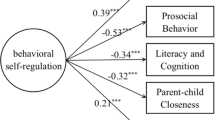Abstract
The relationship between two types of self-control (tolerance of noxious stimulation and resistance to temptation), gross motor control, and social competence was examined in 18 3- to 5-year-old children. Analyses showed that the tolerance type of self-control and the resistance to temptation type were correlated. However, teachers' ratings of social competence correlated differentially with the “tolerance” and “resistance” varieties of self-control. Children who more successfully tolerated noxious stimulation were rated by teachers as more socially competent in terms of cooperativeness and rule compliance. Resistance to temptation was found to be a less reliable index of self-control, and one that correlated with age and gross motor control. Results are interpreted as supportive of the hypothesized relationship between self-control and ratings of classroom competence in preschoolers.
Similar content being viewed by others
References
Anderson, S., & Messick, S. Social competency in young children.Developmental Psychology 1974,10 282–293.
Bem, D. J., & Funder, D. C. Predicting more of the people more of the time: Assessing the personality of situations.Psychological Review 1978,85 485–501.
Combs, M. L., & Slaby, D. A. Social skills training with children. In B. B. Lahey & A. E. Kazdin (Eds.),Advances in clinical child psychology. New York: Plenum, 1977.
Durlak, J. A. Description and evaluation of a behaviorally oriented school-based preventive mental health program.Journal of Consulting and Clinical Psychology 1977,6 48–52.
Gottman, J., Gonso, J., & Rasmussen, B. Social interaction, social competence, and friendship in children.Child Development 1975,46 709–718.
Kanfer, F. H., & Phillips, J. S.Learning foundations of behavior therapy. New York: Wiley, 1970.
Karoly, P. Self-management problems in children. In E. J. Mash & L. G. Terdal (Eds.),Behavioral assessment of childhood disorders. New York: Guilford Press, 1980.
Karoly, P., & Dirks, M. Developing self-control in preschool children through correspondence training.Behavior Therapy 1977,8 398–405.
Karoly, P., & Kanfer, F. H. Effects of prior contractual experiences on self-control in children.Developmental Psychology 1974,10 459–460.
Kirschenbaum, D. S. Social competence intervention and evaluation in the inner city: Cincinnati's Social Skills Development Program.Journal of Consulting and Clinical Psychology 1979,47 778–780.
Kohn, M., & Rosman, B. L. A social competence scale and symptom checklist for the preschool child: Factor dimensions, their cross-instrument generality, and longitudinal persistence.Developmental Psychology 1972,6 430–444.
Maccoby, E. E., Dowley, E. M., Hagan, J., & Degerman, R. Activity level and intellectual functioning in normal preschool children.Child Development 1965,36 761–770.
Medinnus, G. R. Age and sex differences in conscience development.Journal of Genetic Psychology 1966,109 117–118.
Miller, D. T., Weinstein, S. M., & Karniol, R. Effects of age and self-verbalization on children's ability to delay gratification.Developmental Psychology 1978,14 569–570.
O'Leary, K. D. Behavior modification in the classroom: A rejoinder to Winett and Winkler.Journal of Applied Behavior Analysis 1972,5 505–511.
Rosenthal, R., & Jacobson, L.Pygmalion in the classroom: Teacher expectation and pupils' intellectual development. New York: Holt, Rinehart & Winston, 1968.
Spivack, G., Platt, J. J., & Shure, M.The problem-solving approach to adjustment. San Francisco: Jossey-Bass, 1976.
Sundberg, N. D., Snowden, L. R., & Reynolds, W. M. Toward assessment of personal competence and incompetence in life situations.Annual Review of Psychology 1978,29 179–221.
Toner, I. J., Holstein, R. B., & Hetherington, E. M. Reflection-impulsivity and self-control in preschool children.Child Development 1977,48 239–245.
Walsh, R. P. Sex, age, and temptation.Psychological Reports 1967,21 625–629.
Winett, R. A., & Winkler, R. C. Current behavior modification in the classroom: Be still, be quiet, be docile.Journal of Applied Behavior Analysis 1972,5 499–504.
Author information
Authors and Affiliations
Additional information
The authors greatly appreciate the important contributions to all aspects of this study made by Paul Karoly.
Rights and permissions
About this article
Cite this article
Humphrey, L.L., Kirschenbaum, D.S. Self-control and perceived social competence in preschool children. Cogn Ther Res 5, 373–379 (1981). https://doi.org/10.1007/BF01173689
Issue Date:
DOI: https://doi.org/10.1007/BF01173689




